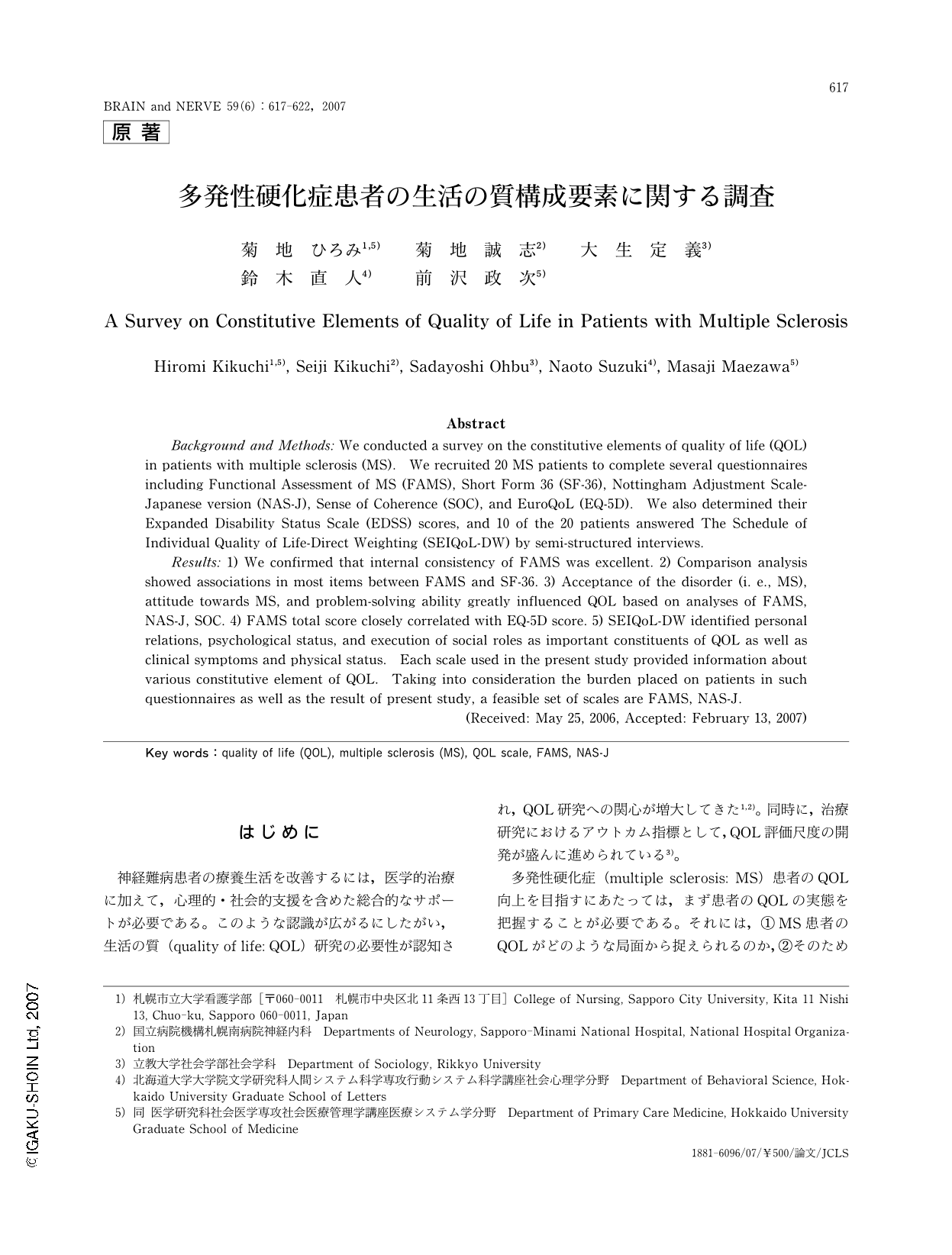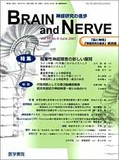Japanese
English
- 有料閲覧
- Abstract 文献概要
- 1ページ目 Look Inside
- 参考文献 Reference
はじめに
神経難病患者の療養生活を改善するには,医学的治療に加えて,心理的・社会的支援を含めた総合的なサポートが必要である。このような認識が広がるにしたがい,生活の質(quality of life: QOL)研究の必要性が認知され,QOL研究への関心が増大してきた1,2)。同時に,治療研究におけるアウトカム指標として,QOL評価尺度の開発が盛んに進められている3)。
多発性硬化症(multiple sclerosis: MS)患者のQOL向上を目指すにあたっては,まず患者のQOLの実態を把握することが必要である。それには,①MS患者のQOLがどのような局面から捉えられるのか,②そのための評価尺度はどうあるべきか,という2つの課題に同時に答えることが求められる。また,MS患者のQOLを評価する尺度は,病期・病型・重症度を広くカバーし,心理的要素,環境条件を含むことが必要である。加えて,患者が妥当であると考える結果を提示できるものでなくてはならない。
疾患特異的QOL尺度のFAMS(functional assessment of multiple sclerosis)は,従来からMS患者のQOL調査において最も多く用いられている標準的尺度であり,QOLを多面的に捉えることができるとされている4,5)。しかし,日本語版については,予備研究の学会発表があるのみで,適切性の再確認が必要とされてきた。健康関連一般尺度のSF-36(The 36-item short form health survey)は,各種疾患の患者に加えて,一般健康人に対しても用いられるQOL尺度で,汎用性が極めて高く,多数の研究により標準値も報告されている6,7)。SF-36とFAMSを比較することで,FAMSの構成要素の過不足を検討でき,さらにFAMSの疾患特異的という特徴の優越性(あるいは劣等性)が検証できると考えた。一方,FAMSだけでは不十分な心理的要素の評価については,NAS-J(The Nottingham Adjustment Scale Japanese version),SOC(Sense of Coherence)の日本語版標準化が済んでおり利用可能である8,9)。効用値評価のためのEQ-5D(Euro Qol)は,簡便であり補助的なアウトカム評価項目として用いられることがあるので,FAMSとの関連性を調べた。また,最近QOL研究の分野で注目されているSEIQoL-DW(schedule for the evaluation of individual quality of life-direct weighting)は,患者個人のQOLの変化を経時的に評価するのに有用であり,調査の過程自体が,ナラティブの再構築という点で治療にも役立つとの指摘があるので,検討を行った。 本研究では,以上の6種類の評価尺度を用いて,MS患者のQOLの構成要素を確認するとともに,各QOL評価尺度の適切性・有用性を検討した。
Abstract
Background and Methods: We conducted a survey on the constitutive elements of quality of life (QOL) in patients with multiple sclerosis (MS). We recruited 20 MS patients to complete several questionnaires including Functional Assessment of MS (FAMS),Short Form 36 (SF-36),Nottingham Adjustment Scale-Japanese version (NAS-J),Sense of Coherence (SOC),and EuroQoL (EQ-5D). We also determined their Expanded Disability Status Scale (EDSS) scores,and 10 of the 20 patients answered The Schedule of Individual Quality of Life-Direct Weighting (SEIQoL-DW) by semi-structured interviews.
Results: 1) We confirmed that internal consistency of FAMS was excellent. 2) Comparison analysis showed associations in most items between FAMS and SF-36. 3) Acceptance of the disorder (i. e.,MS),attitude towards MS,and problem-solving ability greatly influenced QOL based on analyses of FAMS,NAS-J,SOC. 4) FAMS total score closely correlated with EQ-5D score. 5) SEIQoL-DW identified personal relations,psychological status,and execution of social roles as important constituents of QOL as well as clinical symptoms and physical status. Each scale used in the present study provided information about various constitutive element of QOL. Taking into consideration the burden placed on patients in such questionnaires as well as the result of present study,a feasible set of scales are FAMS,NAS-J.
(Received: May 25,2006,Accepted: February 13,2007)

Copyright © 2007, Igaku-Shoin Ltd. All rights reserved.


